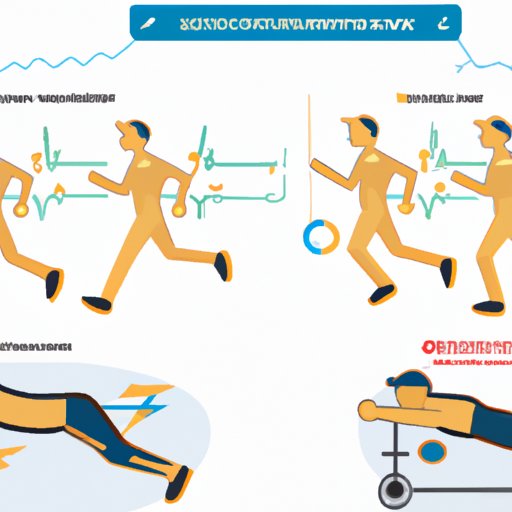Introduction: Why is Working Out So Hard?
Exercise is widely recommended for its health benefits, but many people find it difficult to stick with a regular workout regimen. While there are numerous factors that contribute to this difficulty, understanding why working out can be so hard is essential for developing an effective plan to stay on track. This article will explore the physiological impacts of exercise on the body, uncover the mental challenges associated with working out, examine the role of diet and nutrition in successful exercise, recognize the benefits of working out despite difficulty, investigate common mistakes that make it harder to work out, and provide strategies for overcoming the obstacles of working out.

The Physiological Impact of Exercise on the Body
Exercise is a physical activity, so it’s no surprise that the body plays a major role in determining how easy or hard it is to work out. When you exercise, your muscles contract and produce lactic acid, which can cause fatigue and soreness. Additionally, your heart rate increases during exercise, which can lead to shortness of breath and exhaustion. These physiological effects are normal and expected when exercising, but they can also make it difficult to stay motivated and keep going.
Common physical challenges associated with working out include muscle fatigue, joint pain, and dehydration. Muscle fatigue is caused by the buildup of lactic acid, which can lead to feelings of exhaustion and make it difficult to continue exercising. Joint pain is often caused by overuse or improper form when lifting weights or doing other exercises. Dehydration occurs when the body does not have enough water to support its activities, which can lead to lightheadedness, dizziness, and muscle cramps. All of these physical challenges can make it difficult to stay motivated and keep exercising.

Uncovering the Mental Challenges of Working Out
In addition to the physical challenges of working out, there are also mental challenges that can make it difficult to stay motivated and keep going. Mental strength is essential for pushing through physical barriers and staying focused on the task at hand. Without mental strength, it can be easy to give up or become overwhelmed by the challenge.
Identifying and overcoming mental blocks is key to making working out easier. Mental blocks can take many forms, from self-doubt to fear of failure. Recognizing these blocks and finding ways to address them is essential for making progress and achieving success. This can include setting realistic goals, celebrating small successes, and enlisting the help of friends and family for support.

Understanding the Relationship Between Diet and Exercise
Diet plays a major role in successful exercise, yet many people overlook the importance of proper nutrition when trying to achieve their fitness goals. Eating the right foods before, during, and after exercise helps to fuel the body and ensure that it has the energy it needs to perform. A balanced diet that includes plenty of protein, carbohydrates, and healthy fats is essential for providing the body with the nutrients it needs to stay energized and recover quickly.
Examining nutrition needs for a successful workout is also important. Hydration is essential for preventing dehydration and keeping the body cool during exercise. Eating a healthy snack before and after exercise can help to fuel the body and promote recovery. Additionally, eating meals high in protein and complex carbohydrates can help to build muscle and maintain energy levels throughout the day.
Exploring the Benefits of Working Out Despite Difficulty
Despite the challenges of working out, there are also numerous benefits that come with consistent exercise. Regular exercise can help to improve physical health, reduce stress, boost mood, and increase energy levels. Additionally, exercise can help to improve sleep quality, strengthen the immune system, and reduce the risk of chronic disease. Despite the difficulty of working out, the rewards that come with it make it worth the effort.
Maintaining motivation despite difficulty is key to reaping the benefits of exercise. Setting realistic goals, tracking progress, and rewarding yourself for sticking with a routine can all help to keep you motivated and on track. Additionally, finding activities that you enjoy can help to make working out more enjoyable and make it easier to stay on track.
Examining Common Mistakes That Make Working Out Harder
While working out can be challenging, there are also some common mistakes that can make it even harder. Not warming up properly before exercise can lead to injury and make it difficult to get into a groove. Overtraining is another common mistake that can lead to burnout and make it harder to stay motivated. Additionally, not getting enough rest can make it difficult to recover and stay energized for workouts.
Identifying and avoiding common mistakes is essential for successful exercise. Taking time to warm up and cool down properly before and after exercise can help to prevent injury and keep the body healthy. Listening to your body and giving it enough rest is also essential for maintaining energy levels and avoiding burnout. Additionally, avoiding the temptation to overdo it each time you work out can help to prevent injury and ensure that you’re able to stay on track with your routine.
Investigating How to Overcome the Obstacles of Working Out
Finding support systems to help stay on track is essential for successful exercise. Enlisting the help of friends and family can provide much needed encouragement and accountability, while joining a gym or online fitness community can help to keep you motivated and on track. Additionally, hiring a personal trainer or coach can provide personalized advice and guidance for reaching your goals.
Developing an individual plan to make working out easier is also important. Identifying the obstacles that make it difficult to work out and developing strategies to address them can help to make exercise more manageable. This can include setting realistic goals, breaking up workouts into smaller chunks, and finding activities that you enjoy. Additionally, taking time to stretch and cool down after each session can help to reduce muscle soreness and fatigue.
Conclusion
Working out can be difficult for many people, but understanding the physical, mental, and nutritional challenges that make it hard to exercise can help to develop an effective plan to stay on track. Examining the physiological impacts of exercise on the body, uncovering the mental challenges associated with working out, exploring the relationship between diet and exercise, recognizing the benefits of working out despite difficulty, investigating common mistakes that make it harder to work out, and finding ways to overcome the obstacles of working out are all essential for successful exercise. With the right plan in place, anyone can reap the rewards that come with consistent exercise.
(Note: Is this article not meeting your expectations? Do you have knowledge or insights to share? Unlock new opportunities and expand your reach by joining our authors team. Click Registration to join us and share your expertise with our readers.)
